The Future of Billing in Retail
September 1, 2024
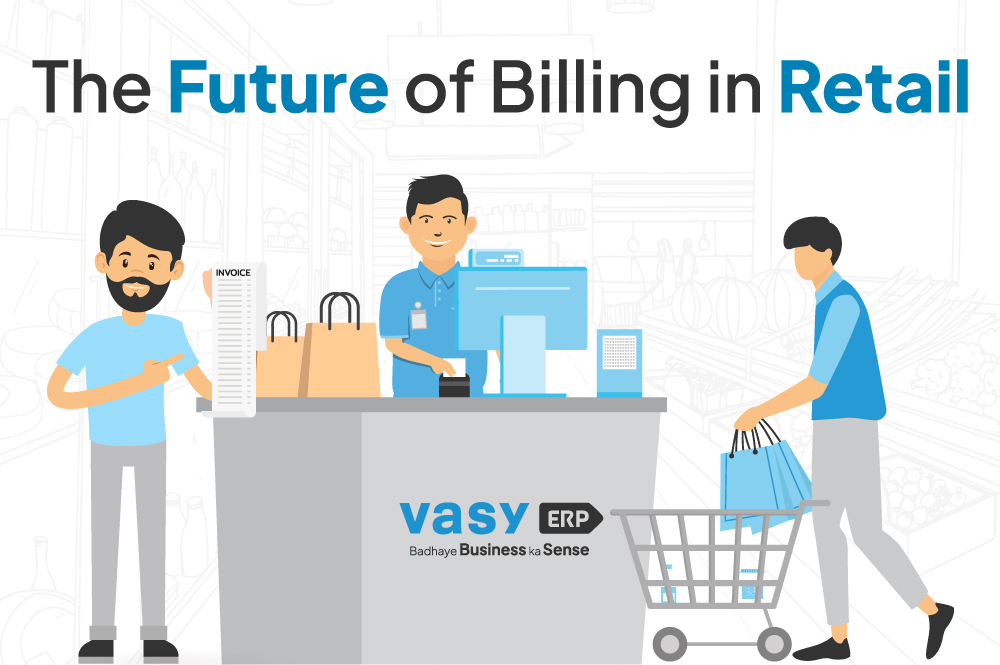
The future of retail billing is digital. Integrated POS software solutions with multiple cash counter management capabilities, payment gateway integrations, and advanced features for managing returns, exchanges, loyalty points, etc. will make their way into retail stores. The future of billing is agile, fast, and no-queue counters. Retailers are increasingly implementing POS billing software that appeals to modern shoppers like the one that can send digital invoices to their customer’s smartphones or something that comes with customer-facing displays or self-checkout functions.
In India, 70% of the population makes their retail purchase through offline or physical stores. However, customers want quick services in the modern world where everybody is in a rush. However, some Indian retailers still use traditional billing or invoicing methods like registers and notebooks or old software systems.
Retailers, particularly chains like supermarkets, hypermarkets, departmental stores, etc. need to fight the competition from online stores and hence need to use modern techniques like advanced billing software to deliver high-quality and quick checkout services.
They need to ensure that they always deliver exceptional customer experiences by automating their retail store billing operations using modern retail billing software.
In this Whitepaper, we take a look at what the future of billing in retail looks like so that retailers can take steps that will benefit them in achieving profit in business while providing the best customer experience.
Over 88 percent of the Indian retail industry consists of “Kirana” stores and the remaining consists of supermarkets/hypermarkets, retail establishments, and online e-commerce. India is home to 15 million retailers and they face multiple problems in the billing process.
Some of these are listed below
For a customer, a visit to a local department or grocery store means spending hours in a long queue for billing. Customers who are in a rush avoid these long queues by visiting other stores during busy days. This means a loss of business for retailers as they can’t provide the best customer experience. A survey reveals that 50% of customers will switch to a competitor after one bad experience and it rises to 80% in case of more than one bad experience.
Even if a customer waits patiently in long queues, more than once the customer’s mode of payment isn’t available at the retail store. For instance, the customer wants to pay via a particular digital wallet or credit card, but the option may not be available. Also, many retailers try to discourage customers from paying via credit cards to avoid transaction fees. The customer then leaves disappointed and stops going back to the particular retail store and the retailer loses a customer and business.
Most retailers in India use time-consuming manual processes for calculation and billing, causing long waiting times for customers. Some Indian retailers still use the paper and pen method, while those who use software are not skilled enough to handle it and this causes errors or delays during billing. There are human errors in calculation that cause additional problems, wasting time, energy, and resources.
Manual entries of product details lead to the generation of errors in counting and invoices and start the loop of refund and exchange leading to loss of precious time for both the retailers and customers. Additionally, manual invoicing causes human errors which can cause losses for the retailers or develop distrust in customers.
Old systems can help in managing transactions to a limit, but cannot interconnect various retail operations (billing, accounting, CRM, etc.), and retailers have to use different systems for different functions like inventory management, accounting, online store, etc. Moreover, traditional software is complex, harder to learn, and prone to crashes and data loss.
Handling returns and exchanges can be complex and time-consuming for retailers if they are still dealing in the old ways or manual methods. Locating the previous bill and Calculating the correct refund amount for returns is overwhelming, especially when retailers are witnessing high footfalls during the seasons.
The new rules of invoicing for retailers, SMEs, and MSMEs introduced in August 2023 significantly changes the paradigm of billing and invoice handling in India. The Central Tax Notification Number 10/2023 notifies that a company or any registered business must follow e-invoicing rules if it generates revenues of more than five crore (INR) in a year. E-invoicing is a challenge for those without any knowledge of how the system works.
So if the future of billing is here, what are the solutions to the above challenges?
To overcome these challenges, retailers need to complete their operations using the latest technology for ease of doing business.
| Traditional/age-old billing processes should be removed and retailer-friendly new methods like integrated POS software should be adopted at billing counters. |
There are several new ways in which retailers can simplify billing management. This helps in saving time to focus on the more important aspects of the business. Retailers should understand customer demand and start taking steps so that they can survive in the competitive market using technology and innovation.
The evolution of retail billing systems with cutting-edge solutions like integrated POS or unmanned billing counters with self-checkout (Amazon Go) has been incredible. Technologies like RFID, barcode readers, payment processors, etc. have already improved how retailers conduct their billing operations.
This Whitepaper discusses the core trends and technologies that are changing the paradigms for retail billing operations:
Below are the top 10 futuristic trends and technologies emerging in retail billing:
The online retail market is booming and Indian retailers can grow online by using POS billing software that uses an omnichannel approach so that products reach customers on all channels, platforms, and devices simultaneously.
Additionally, an omnichannel commerce model in retail helps retailers deliver specific products directly to the customers’ doorsteps by checking the inventory level across all branches, which speeds up delivery and payments. Whether a customer makes a purchase in-store, online, or via the mobile application, the data is updated and inventory is managed across multiple locations.
Omnichannel suites in the POS software allow retailers to get the advantage of integration with online stores like Woocommerce, Shopify, etc, and various payment gateway on a single platform.
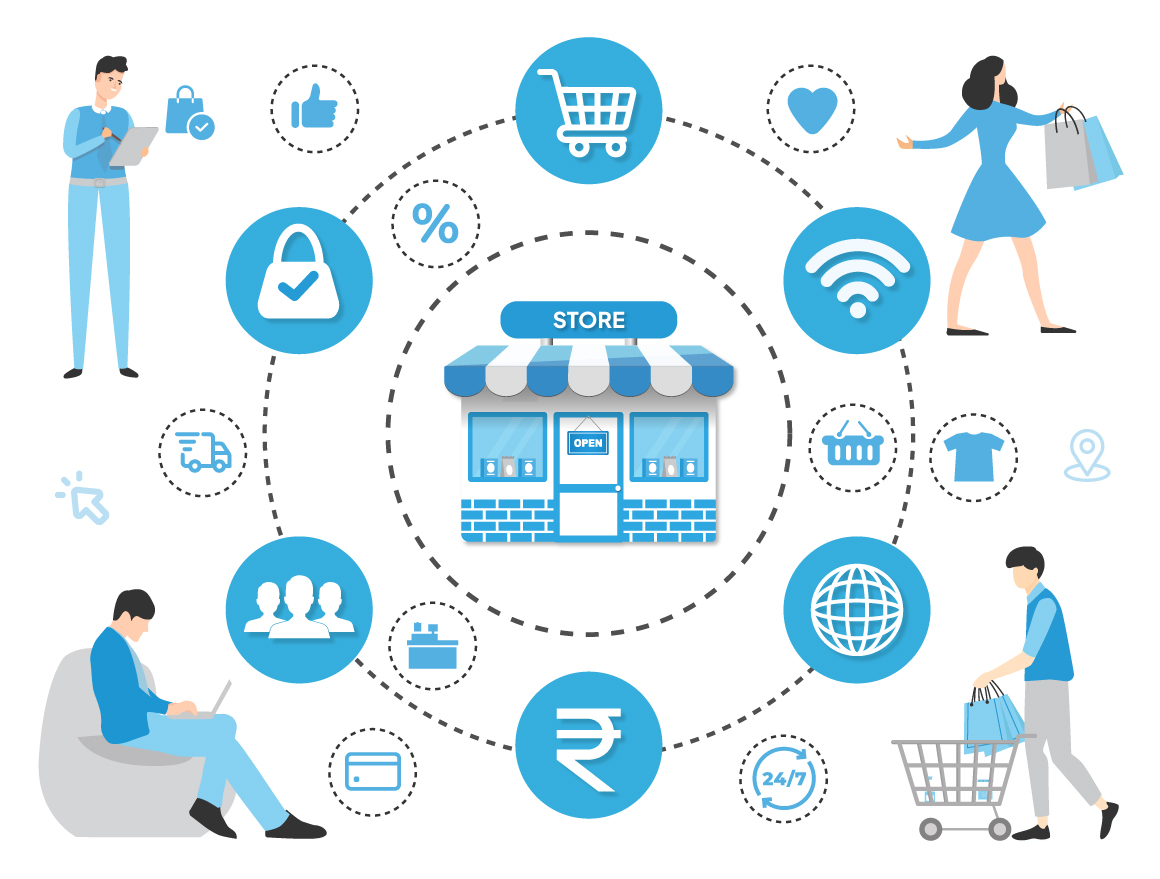
| Omnichannel systems in POS software help retailers integrate and connect online and offline sales and their bills in real time. |
An omnichannel platform like those provided by VasyERP’s POS billing software also helps to get a complete idea about customer preferences and purchase history, through unified customer profiles and analytics on a unified dashboard.
The future shows great opportunities for retailers who can adopt billing systems that provide particular customer analytics. It gives an idea about what products are bought by a particular customer, what items are preferred, number of visits by a particular customer in a month. This can help retailers analyze customer behavior and run the retail business accordingly. The billing and sales data can provide insights into the customer preference and pricing can be adjusted accordingly.
Billing becomes fun for the customer and they keep coming back to those retailers who provide excellent rewards on every purchase. Retailers need to connect with customers by providing them with memberships and incentives for recurring purchases. Their bill should reflect additional discounts that they get after a purchase. This is possible through innovative systems or POS billing software made specially for retail, that integrated billing systems with features that allow loyalty programs and the implementation of digital cards, and gift vouchers.
The future of retail is about making transactions easier using innovation for faster payments. SMSs have a 98% chance of getting opened as more and more people use their fingertips for daily transactions. Compared to other payment methods like e-mails, digital invoices are sent through SMS and are a user-friendly option. The simplified yet new billing modules with SMS integration help you get faster payments as they act as a gentle reminder to take action fast, saving time in follow-ups for payments.
Instead of traditional barcodes, products that are equipped with RFID tags can be read without direct line of sight. When a customer brings items to the checkout, instead of scanning each item individually, an RFID reader can detect all items simultaneously. This is possible because RFID technology can read multiple tags at once, even if they’re not visible or are inside packaging.
With RFID retailers can achieve up to 5% top-line growth.
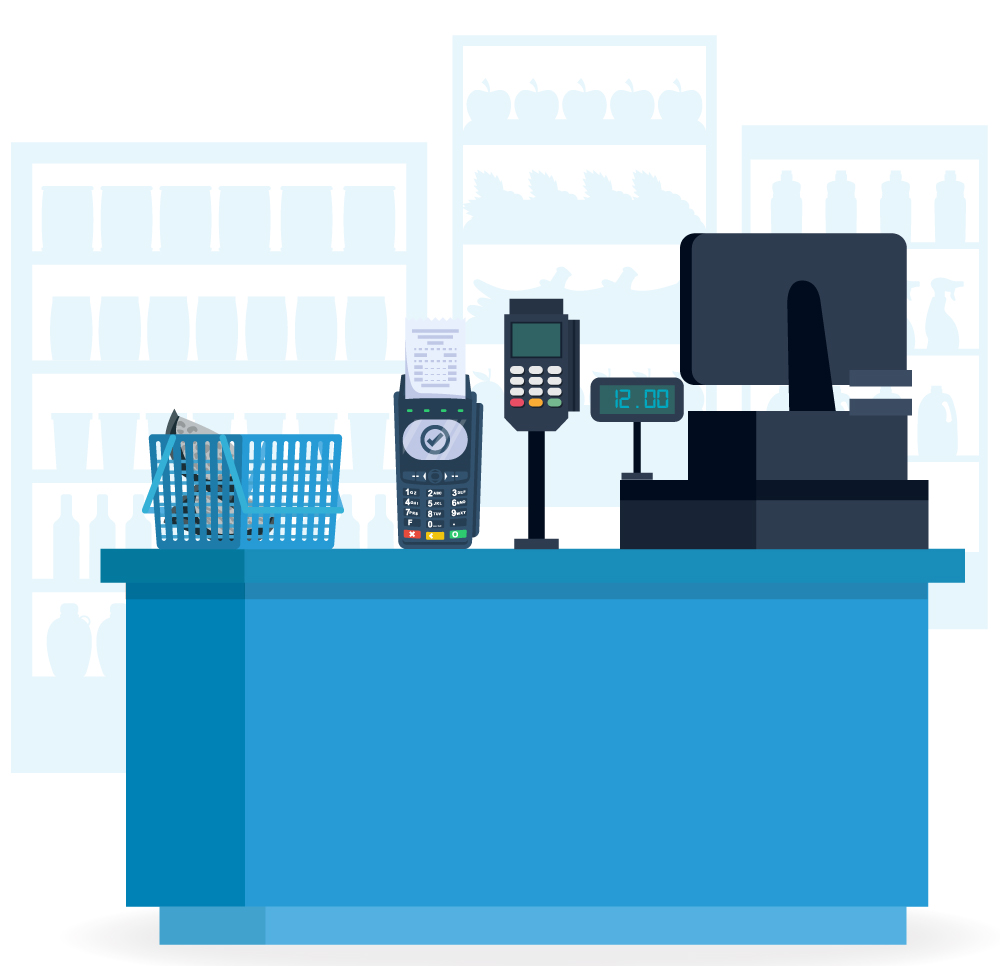
| This simultaneous scanning of all items on the billing counter drastically reduces the time needed for billing. Instead of scanning each item one by one, all items in a shopping cart can be read at once, significantly speeding up the checkout process. |
GST and tax filing are complex processes that every retailer feels anxious about. The future of billing for retailers includes modern POS billing systems that interconnect GST returns with e-invoicing and allow expense management. This can ease tax filing and reduce the risk of errors in tax submissions.
This interlinking can help retailers in tracking transactions to their source (audit trail) and bank reconciliation i.e. retailers can compare their records with the bank statement and get a complete overview of accounts and expenses. These modernized POS billing software can automate the generation of profit and loss statements and balance sheets through a single time entry during billing.
Manual entries about product details like weight, cost, and quantity are a primary cause of concern for billers and customers, as it increases wait time and customers lose patience in long queues.
| Image-based billing is a method where cashiers use visual representations of products instead of text-based menus or product codes for billing purposes. Cashiers simply tap or click on the images of items a customer has ordered or purchased. The system automatically adds the selected items to the bill. |
The future of billing will be based on image capturing where once the customer reaches the billing counter with the product, a single scan of the image will capture all product-related details leading to quick billing and payment. New staff can be trained more quickly as they only need to recognize product images.
The future of billing will include such POS billing software that will speed up the time consumed in billing through image-capturing capability, weight scale integration, and additional features.
Custom billing software is software made specifically for your retail business requirements. It is a solution for retailers who have high workloads at multiple branches. Custom billing software can help retailers automate repetitive tasks and make and receive payments faster according to business requirements.
Invoice formats can be customized, payment options can be made flexible, and personalized payment reminders can be given to customers by tailoring the billing software for these purposes.

Retailers need to look ahead into the future when the use of paper will be banned by the government as a part of saving the environment. The future is digital and paper invoices can be replaced for good by incorporating digital billing techniques that are not only environment-friendly but are also convenient and cost-effective.
Technologies like blockchain, AI/ML, and automation are the future of retail billing. Using invoicing systems on blockchain technology helps retailers add data security, bring transparency to transactions, and lower the risk of fraud.
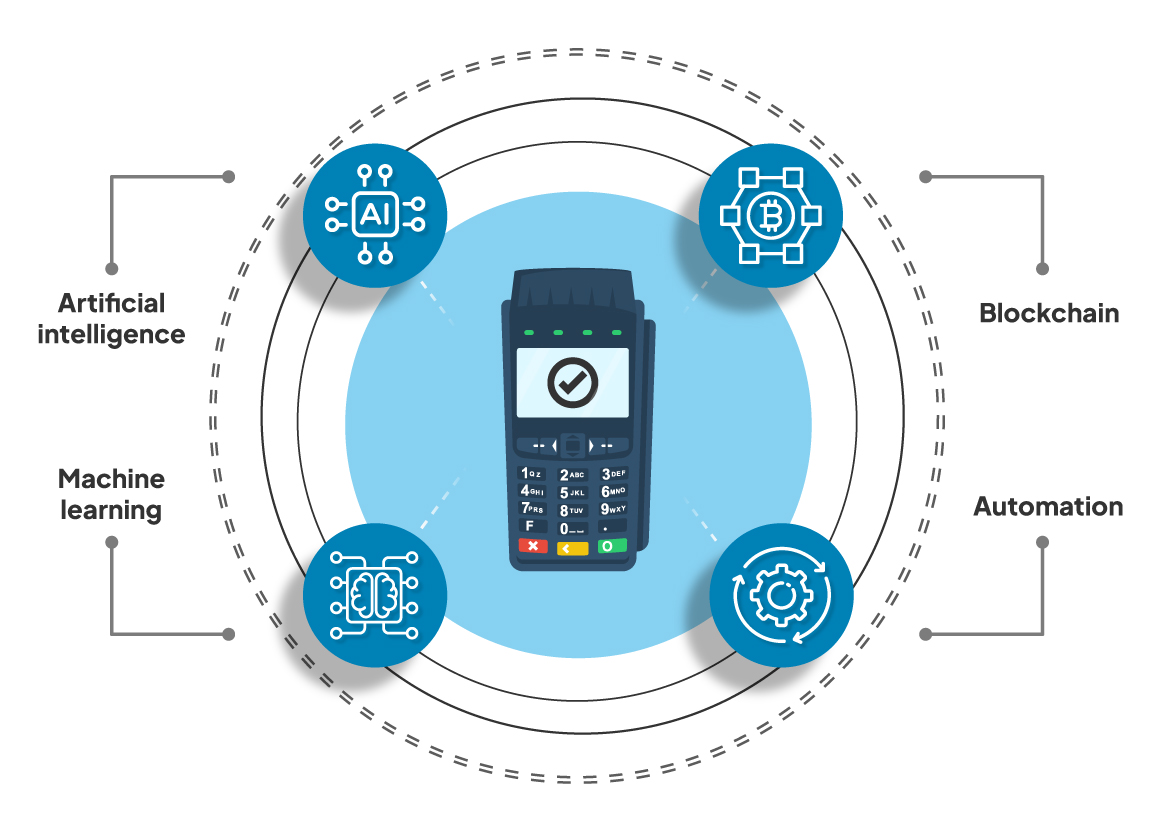
The next step in retail billing is automating data entry, and setting automated reminders, so that retailers can focus on more important aspects of running the business. As the retail business grows it becomes important to ensure security. AI and ML help in detecting fraud, reducing problems due to human errors and tracking financial transactions.
Just Walk Technology at Amazon Go
Customers enter the Amazon Go Store using their Amazon app or a credit card linked to their Amazon account. They can bring their own bags, and backpacks, or even use their pockets for shopping. Shoppers browse the store and select items just as they would in a traditional store. As items are taken from shelves, they are automatically added to the customer’s virtual cart.
If a customer changes their mind, they can simply return the item to the shelf, and it will be removed from their virtual cart.
Amazon Go’s Just Walk Out Technology utilizes a combination of advanced technologies:
Retailers are constantly looking for easier and faster billing mechanisms. Retailers can modernize their retail business by adopting customer-centric new-age techniques like advanced billing software solutions.
| All-in-one billing solutions for retail shops not only make accepting digital payments easier but also track inventory, provide analytics, track customer history, increase customer satisfaction, improve access, and speed up payments. |
Billing software for retail helps add value to the retailer’s business and increases profit.
POS stands for Point of Sale and means the point at which the sale of goods, products, or services happens. For retailers, POS billing means generating bills/invoices for products at POS i.e. the retail store, and getting payments. POS billing software is a computer program designed to help retailers automate billing and payment while providing additional functionalities for overall retail store operations.
Advanced billing point-of-sale systems (POS) for retailers can ease the payment process. They not only enable cash register tracking but also allow multiple modes of payment like debit cards, credit cards, and cash.
They enable contactless payment through e-wallets, UPI, QR codes, and other forms of mobile payments.
Generating sales invoices and payment cycles becomes quicker and refunds and exchange process becomes easier for retailers. Some of the additional features of these modernized POS billing software are listed below:
The future of retail is about user-friendly interfaces and connectivity. Cloud-based software is easier to learn and use and is accessible anywhere, anytime. Cloud-based billing software like those offered by industry leaders like VasyERP, GoFrugal, Marg, Vyapar, Square, etc. can help retailers stay connected to their business.
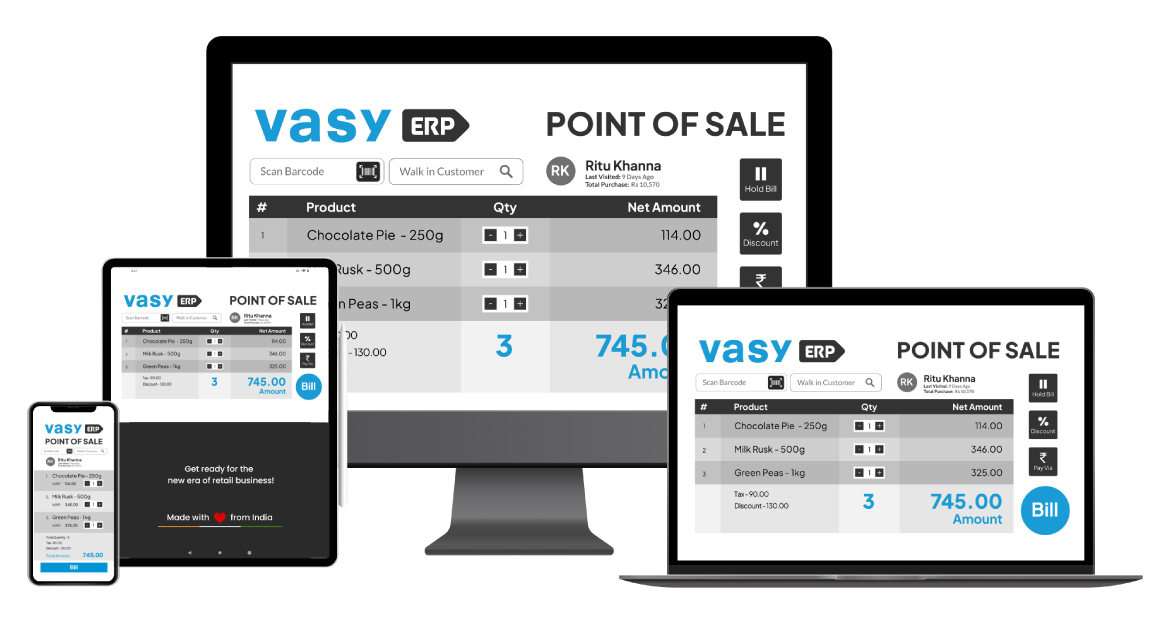
| Retailers need to know what’s happening in their business while enjoying a holiday, traveling, or at home. This is not possible with software that is installed on a particular PC or laptop. Mobile access to billing software is a must in the retail 4.0 era. |
With cloud-based billing software invoicing and payment processing happen quickly and retailers can save money on installation, and maintenance, and get rid of complications when trying for remote access.
Integration of payment gateways at the POS makes billing easier for retailers and helps them add efficiency in operating the retail store billing counters.
A POS billing software that integrates card swipe, UPI, and other payment methods can provide customers with multiple options for initiating payment. This can help with a smoother transaction process and increase sales for retailers as no customer returns empty-handed because of a problem with payment mode.
Retailers that adopt customer-facing displays build brand trust among customers and increase transparency as it helps customers see the order details in real-time saving time consumed in checking the bills after purchase. For instance, VasyERP’s billing software offers this feature that displays every entry made at the billing counter on Television screens and poles.
Retailers can adopt new technology through retail billing software which integrates weight scales with their billing systems for accurate measurements get exact weight records, and bill the correct amount.

A modernized POS billing software for retail can be used to generate barcodes. Barcodes are important in billing. Easy to scan and read, they improve the billing processes. Retailers need to ensure their billing software also has barcode generation functionality.

Billing software with integrated barcode functions can automatically detect the correct price for each item and also ensure that the price for the right variant (color, size, etc) is shown so that the customer is billed accurately and inventory parallelly gets updated.
Integrating automated stock control systems with billing systems is a special feature of integrated billing software, that can help retailers monitor stocks in real time and reduce the risk of billing errors related to items that are no longer in stock. Errors can be avoided by using billing software that updates all the information related to bulk products, manage price variations, and show accurate and latest prices during billing.
Dynamic billing software can change the prices of all products (percentage-wise). This is a great function to improve profit margins during high-demand season. Similarly, expiry alerts or expiry management for retail is an important feature available with futuristic billing software.
Modern billing software with expiry alerts at the time of billing drives customer trust and removes refund hassles by giving near-expiry alerts during billing for items that have a limited shelf life.
Retailers need POS billing software/systems that update the stock immediately on billing. Once a user buys a product, the stock should update immediately and the retailer must be able to do a stock audit while on the move on mobile apps. This can give a sense of direction to the retailer on what products to get more and what to stop buying. Modern billing systems have built-in integrations that allow billing and stock audits to happen in parallel.
Billing today is not limited to generating bills and getting payments. Retail 4.0 is all about the digital ecosystem and the convergence of physical and online stores. As Delloite refers it ‘Retail 4.0 is an active interplay of tech solutions and digitally savvy consumers’. The responsibility of tech solutions lies with those behind the billing counters—retailers. Today’s retailers need a billing system that can take care of all aspects of the retail business including inventory management, analytics, stock audits, CRM, and even accounting at the POS itself!
The future of billing is marked by innovative solutions like cloud-based billing software focused on increasing profit for retailers. While the future of billing is ever-changing, retailers can achieve more than their competitors by using technology to their advantage.
References:
This whitepaper is intended to help retail businesses like supermarkets, grocery stores, gift shops, hypermarket chains, convenience stores, fashion stores, garment stores, stationery retailers, bookstores, hardware stores, pet stores, bakeries, sweet shops, and many more businesses that are a key part of our economy. SMEs, MSMEs, wholesalers, distributors, and even ecommerce businesses can also benefit from learning about billing advancements and futuristic trends.
If you need more details please contact VasyERP
Email: business@vasyerp.com
Phone: +91 8140364036
Website: www.vasyerp.com
Aug 2024 ©VasyERP Solutions Private Limited
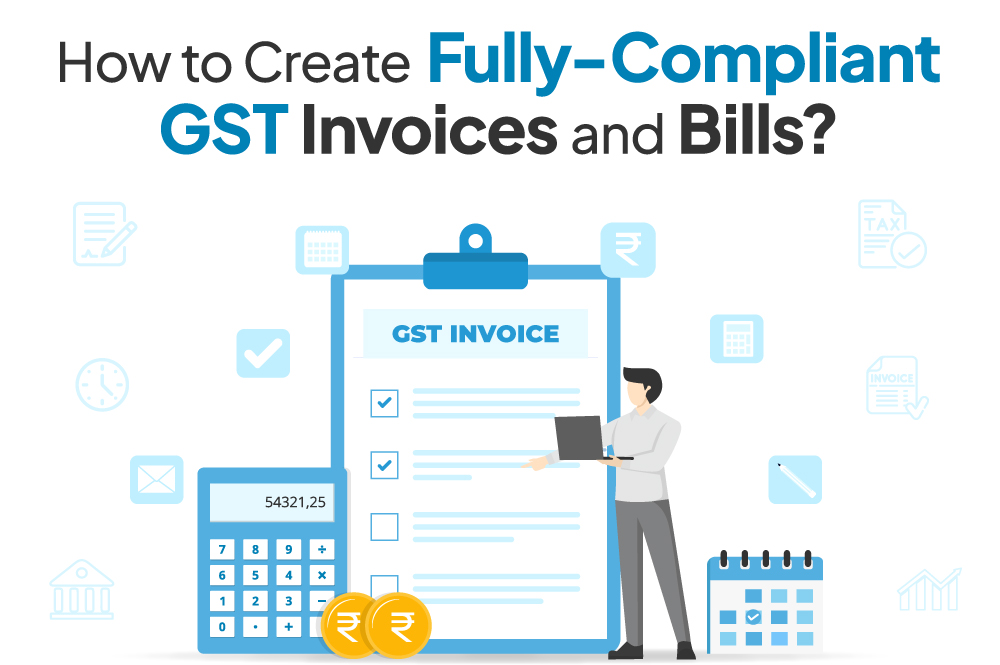
Are you a retailer or wholesaler looking to create full...
September 11, 2024
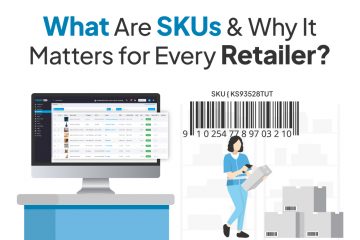
SKUs or stock keeping units are a blend of characters a...
July 27, 2025
